【推荐】仁爱英语七年级下册总复习资料
- 格式:docx
- 大小:44.92 KB
- 文档页数:12
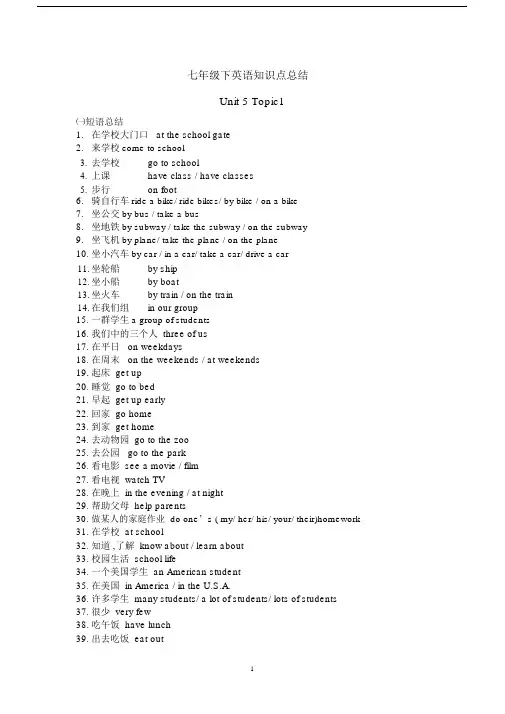
七年级下英语知识点总结Unit 5 Topic1㈠短语总结1.在学校大门口 at the school gate2.来学校come to school3. 去学校go to school4. 上课have class / have classes5. 步行on foot6.骑自行车ride a bike/ ride bikes/ by bike / on a bike7.坐公交by bus / take a bus8.坐地铁by subway / take the subway / on the subway9.坐飞机by plane/ take the plane / on the plane10.坐小汽车by car / in a car/ take a car/ drive a car11. 坐轮船by ship12. 坐小船by boat13. 坐火车by train / on the train14. 在我们组in our group15.一群学生a group of students16.我们中的三个人 three of us17.在平日 on weekdays18.在周末 on the weekends / at weekends19.起床 get up20.睡觉 go to bed21.早起 get up early22.回家 go home23.到家 get home24.去动物园 go to the zoo25.去公园 go to the park26.看电影 see a movie / film27.看电视 watch TV28.在晚上 in the evening / at night29.帮助父母 help parents30.做某人的家庭作业 do one’s ( my/ her/ his/ your/ their)homework31.在学校 at school32.知道 ,了解 know about / learn about33.校园生活 school life34.一个美国学生 an American student35.在美国 in America / in the U.S.A.36.许多学生 many students/ a lot of students/ lots of students37.很少 very few38.吃午饭 have lunch39.出去吃饭 eat out40.在校期 on school days41.休息一会 have a short rest/ break42.午后 after lunch43.在某人的余 in one’s ( my/ his/ her/ their⋯)free/ spare time44.打球 play basketball45.踢足球 play soccer / football46.琴 play the piano47.吉他 play the guitar48.拉二胡 play erhu49.去游泳 go swimming / go for a swim50.去划船 go boating51.球 a ball game / ball games52.一年四次 four times a year53.听音 listen to music54.read books55.看 read newspapers56.看医生 see a doctor57.去 go to the library58.一周两次 twice a week59.朋友 meet friends60.每天 every day61.在七点半 at half past seven62.一小会 for a little while / for a short time63.晚后 after supper64.吃 have dinner65.吃早 have breakfast㈡重要句型1.I usually come to school by subway.同句 : I usually take the subway to school.划部分提 : How do you usually come to school?似的有:go to school by bike=go to schoolon a bike= ride a bike to school=ride to schoolgo home by bus=go home on a bus=take a bus home2.How do you usually/ often⋯?你通常 /常怎⋯?3.It ’stime for class.=It’s time to have class. =It’s time for having class.4.What about you? =How about you?5.How often ⋯? 率,回答可以用率副: always, usually, often,sometimes, seldom, never, every day ,every +其他名或表示率的短回答表示率的短:次数 +位e.g. : once a day / twice a week / three times a month6.The early bird catches the work. ( ) 笨先7.Work / Study must come first. 工作 / 学必放在第一位!8. Classes begin at eight. =Class begins at eight.提问:What time does the class begin? / What time do the classes begin?㈢重要单词的用法1.look (感官动词 ) 看起来,后面加形容词His mother looks very young.They look very cute.Her dress looks very nice.You look very cool in this coat.2. by 介词by 后面直接加表示交通工具的名词,中间不用任何词修饰,如: by bike by +动词 ing 形式,表示通过某种方式People show love to their mothers by giving cards.You can be a good student by working hard.3.over (形容词 ) School/ Class is over.4.begin现在分词 : beginning 过去式 : beganbegin to do sth , begin doing sthHe begins to write a letter. =He begins writing a letter.如果 begin 本身为分词,只能用begin to do sthHe is beginning to run.5.listen to 听(动作), hear 听见 (结果 )6.always 反义词 never7.本话题涉及的时态为一般现在时,句中常有频率副词或表示频率的短语,如果主语为三单,动词一定要用三单!(四)易错题1.You new watch ______ (look) very nice!2.Here ______(be) some news.3.Oh, come on! It’s time_____ going to school.4.They usually go to school on ________(feet).5.In my class, forty of _______(we) go to school by bike.6.The early bird ______ (catch) the worm.7.Kangkang often _____ (ride) a bike to the park.8.What time _____ (be)school over?9.Work must come ______(once).10.It ’stime ____you to get up.11.We often _____ books in the morning.12.Jill ’s friend like ______(study) in our school.13.Mr. Wang teaches ______(we) English. _____ of us like him.14.How about ______(go) out with me?15.Most students go to school _____ the school bus.16._______ do you go shopping with your mother?A. How soonB. How farC. How oftenD. How much17. What time do you usually get up _____ weekdays?18. He ______ busy, so he has no time to play with us.A. is alwaysB. seldom isC. always isD. often is19.The last class______(finish) at twelve o’clock.20.Let’s go______(boat).21.It’stime to have breakfast. 同(义句 )______________________________________________________.22.Michael often rides a bike to school. 同(义句 )______________________________________________________.23.I always go to work on foot. (对划线部分提问 )______________________________________________________.24.My mother goes shopping twice a week. 对(划线部分提问 )______________________________________________________.25.Mary always reads books in the library. 反(义句 )______________________________________________________.26.He usually does his homework at school.否(定句 )______________________________________________________.27.They often go to school by bus in the morning. 对(划线部分提问 ) ______________________________________________________.28.Jane seldom watches TV on weekdays改.(为一般疑问句 )______________________________________________________.29.He usually has lunch at home. 对(划线部分提问 )______________________________________________________.30.Li Ping often goes to work on foot. (同义句 )______________________________________________________.31.几乎没有学生乘地铁去学校。
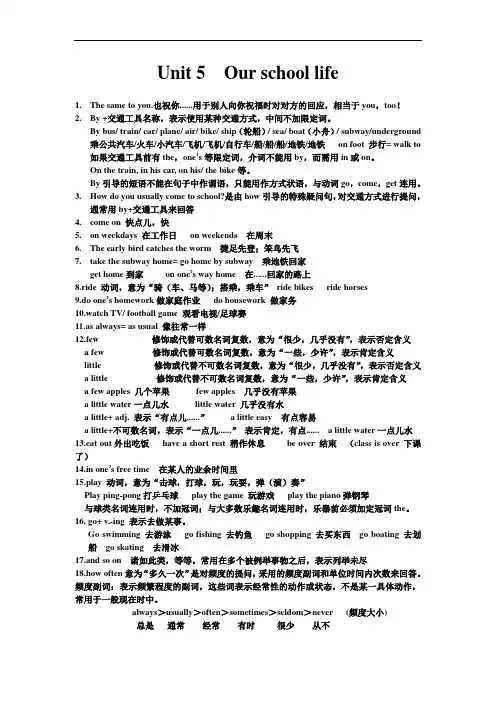
Unit 5 Our school life1.The same to you.也祝你......用于别人向你祝福时对对方的回应,相当于you,too!2.By +交通工具名称,表示使用某种交通方式,中间不加限定词。
By bus/ train/ car/ plane/ air/ bike/ ship(轮船)/ sea/ boat(小舟)/ subway/underground 乘公共汽车/火车/小汽车/飞机/飞机/自行车/船/船/船/地铁/地铁on foot 步行= walk to 如果交通工具前有the,one’s等限定词,介词不能用by,而需用in或on。
On the train, in his car, on his/ the bike等。
By引导的短语不能在句子中作谓语,只能用作方式状语,与动词go,come,get连用。
3.How do you usually come to school?是由how引导的特殊疑问句,对交通方式进行提问,通常用by+交通工具来回答e on 快点儿,快5.on weekdays 在工作日on weekends 在周末6.The early bird catches the worm 捷足先登;笨鸟先飞7.take the subway home= go home by subway 乘地铁回家get home到家on one’s way home 在......回家的路上8.ride 动词,意为“骑(车、马等);搭乘,乘车”ride bikes ride horses9.do one’s homework做家庭作业do housework 做家务10.watch TV/ football game 观看电视/足球赛11.as always= as usual 像往常一样12.few 修饰或代替可数名词复数,意为“很少,几乎没有”,表示否定含义a few 修饰或代替可数名词复数,意为“一些,少许”,表示肯定含义little 修饰或代替不可数名词复数,意为“很少,几乎没有”,表示否定含义a little 修饰或代替不可数名词复数,意为“一些,少许”,表示肯定含义a few apples 几个苹果few apples 几乎没有苹果a little water一点儿水little water 几乎没有水a little+ adj. 表示“有点儿......” a little easy 有点容易a little+不可数名词,表示“一点儿......”表示肯定,有点...... a little water一点儿水13.eat out外出吃饭have a short rest 稍作休息be over 结束(class is over 下课了)14.in one’s free time 在某人的业余时间里15.play 动词,意为“击球,打球,玩,玩耍,弹(演)奏”Play ping-pong打乒乓球play the game 玩游戏play the piano弹钢琴与球类名词连用时,不加冠词;与大多数乐趣名词连用时,乐器前必须加定冠词the。
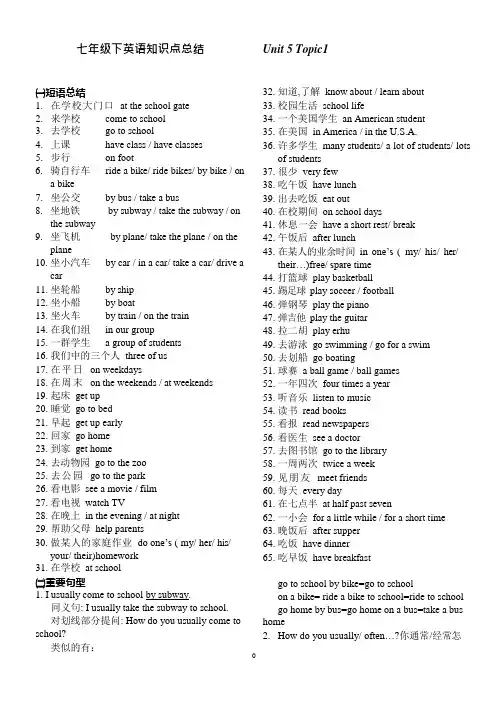
七年级下英语知识点总结Unit 5 Topic1㈠短语总结1.在学校大门口at the school gate2.来学校come to school3.去学校go to school4.上课have class / have classes5.步行on foot6.骑自行车ride a bike/ ride bikes/ by bike / ona bike7.坐公交by bus / take a bus8.坐地铁by subway / take the subway / onthe subway9.坐飞机by plane/ take the plane / on theplane10.坐小汽车by car / in a car/ take a car/ drive acar11.坐轮船by ship12.坐小船by boat13.坐火车by train / on the train14.在我们组in our group15.一群学生 a group of students16.我们中的三个人three of us17.在平日on weekdays18.在周末on the weekends / at weekends19.起床get up20.睡觉go to bed21.早起get up early22.回家go home23.到家get home24.去动物园go to the zoo25.去公园go to the park26.看电影see a movie / film27.看电视watch TV28.在晚上in the evening / at night29.帮助父母help parents30.做某人的家庭作业do one’s ( my/ her/ his/your/ their)homework31.在学校at school㈡重要句型1. I usually come to school by subway.同义句: I usually take the subway to school.对划线部分提问: How do you usually come to school? 32.知道,了解know about / learn about33.校园生活school life34.一个美国学生an American student35.在美国in America / in the U.S.A.36.许多学生many students/ a lot of students/ lotsof students37.很少very few38.吃午饭have lunch39.出去吃饭eat out40.在校期间on school days41.休息一会have a short rest/ break42.午饭后after lunch43.在某人的业余时间in one’s( my/ his/ her/their…)free/ spare time44.打篮球play basketball45.踢足球play soccer / football46.弹钢琴play the piano47.弹吉他play the guitar48.拉二胡play erhu49.去游泳go swimming / go for a swim50.去划船go boating51.球赛a ball game / ball games52.一年四次four times a year53.听音乐listen to music54.读书read books55.看报read newspapers56.看医生see a doctor57.去图书馆go to the library58.一周两次twice a week59.见朋友meet friends60.每天every day61.在七点半at half past seven62.一小会for a little while / for a short time63.晚饭后after supper64.吃饭have dinner65.吃早饭have breakfastgo to school by bike=go to schoolon a bike= ride a bike to school=ride to schoolgo home by bus=go home on a bus=take a bus home2.How do you usually/ often…?你通常/经常怎样…?3.It’s time for class.=It’s time to have class. =It’stime for having class.4.What about you? =How about you?5.How often …?询问频率,回答可以用频率副词:always, usually, often, sometimes, seldom, never, every day ,every +其他时间名词或表示频率的短语回答表示频率的短语:次数+单位时间e.g. : once a day / twice a week / three times a month6.The early bird catches the work. (谚语) 笨鸟先飞7.Work / Study must come first. 工作/ 学习必须放在第一位!8.Classes begin at eight. =Class begins at eight.提问:What time does the class begin? / What time do the classes begin?㈢重要单词的用法1. look (感官动词) 看起来,后面加形容词His mother looks very young.They look very cute.Her dress looks very nice.You look very cool in this coat.1.You new watch (look) very nice!2.Here (be) some news.3.Oh, come on! It’s time going to school.4.They usually go to school on (feet).5.In my class, forty of (we) go to schoolby bike. 2.by 介词by 后面直接加表示交通工具的名词,中间不用任何词修饰,如:by bikeby +动词ing 形式,表示通过某种方式People show love to their mothers by giving cards.You can be a good student by working hard. 3.over ( 形容词)School / Class is over.4.begin现在分词: beginning 过去式: beganbegin to do sth , begin doing sthHe begins to write a letter. =He begins writing a letter.如果begin 本身为分词,只能用begin to do sthHe is beginning to run.5.listen to 听(动作),hear 听见(结果)6.always 反义词never7.本话题涉及的时态为一般现在时,句中常有频率副词或表示频率的短语,如果主语为三单,动词一定要用三单!(四)易错题us.A. is alwaysB. seldom isC. always isD. often is19.The last class (finish) at twelve o’clock.20.Let’s go (boat).21.It’s time to have breakfast. (同义句)6.The early bird (catch) the worm.7.Kangkang often (ride) a bike to the park. .8.What time (be)school over? 22. Michael often rides a bike to school. (同义句)9.Work must come (once).10.It’s time you to get up.11.We often books in the morning..23. I always go to work on foot. (对划线部分提问)12.Jill’s friend like (study) in our school.13.Mr. Wang teaches (we) English. .of us like him.14.How about (go) out with me? 24.My mother goes shopping twice a week. ( 对划线部分提问)15.Most students go to school the school bus.16.do you go shopping with your mother?A. How soonB. How farC. How oftenD. How much.25.Mary always reads books in the library. (反义句)17.What time do you usually get up .weekdays?18.He busy, so he has no time to play with 26.He usually does his homework at school. (否定句).27.They often go to school by bus in the morning.(对划线部分提问)(一) 重要单词:Unit5 Topic2.28.Jane seldom watches TV on weekdays. (改为一般疑问句).29.He usually has lunch at home. (对划线部分提问).30.Li Ping often goes to work on foot. (同义句).31.几乎没有学生乘地铁去学校。
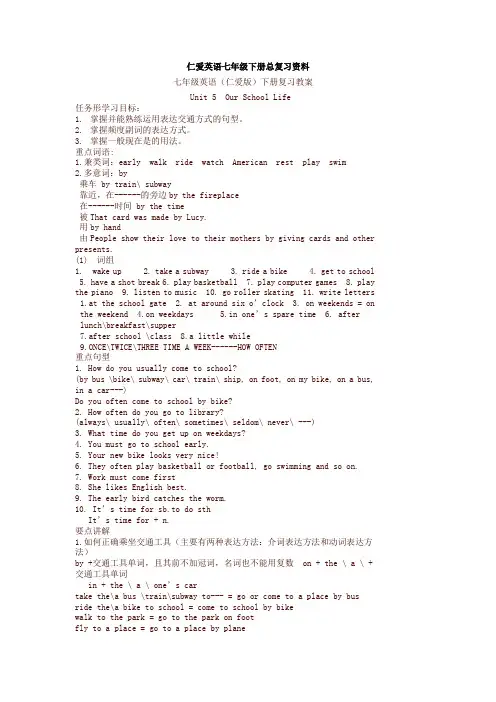
仁爱英语七年级下册总复习资料七年级英语(仁爱版)下册复习教案Unit 5 Our School Life任务形学习目标:1.掌握并能熟练运用表达交通方式的句型。
2.掌握频度副词的表达方式。
3.掌握一般现在是的用法。
重点词语:1.兼类词:early walk ride watch American rest play swim2.多意词:by乘车 by train\ subway靠近,在------的旁边by the fireplace在------时间 by the time被That card was made by Lucy.用by hand由People show their love to their mothers by giving cards and other presents.(1) 词组1. wake up2. take a subway3. ride a bike4. get to school5. have a shot break6. play basketball7. play computer games8. play the piano9. listen to music 10. go roller skating 11. write letters 1.at the school gate 2. at around six o’clock 3. on weekends = on the weekend 4.on weekdays 5.in one’s spare time 6. after lunch\breakfast\supper7.after school \class 8.a little while9.ONCE\TWICE\THREE TIME A WEEK------HOW OFTEN重点句型1. How do you usually come to school?(by bus \bike\ subway\ car\ train\ ship, on foot, on my bike, on a bus, in a car---)Do you often come to school by bike?2. How often do you go to library?(always\ usually\ often\ sometimes\ seldom\ never\ ---)3. What time do you get up on weekdays?4. You must go to school early.5. Your new bike looks very nice!6. They often play basketball or football, go swimming and so on.7. Work must come first8. She likes English best.9. The early bird catches the worm.10. It’s time for sb.to do sthIt’s time for + n.要点讲解1.如何正确乘坐交通工具(主要有两种表达方法:介词表达方法和动词表达方法)by +交通工具单词,且其前不加冠词,名词也不能用复数 on + the \ a \ +交通工具单词in + the \ a \ one’s cartake the\a bus \train\subway to--- = go or come to a place by busride the\a bike to school = come to school by bikewalk to the park = go to the park on footfly to a place = go to a place by plane2.区别下列特殊疑问词How often 多久一次,是提问频率的疑问词,回答常用频率副词,常与一般现在时连用。
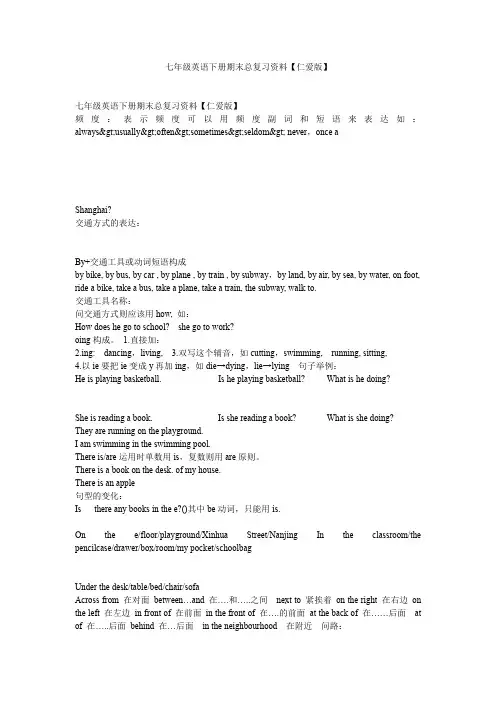
七年级英语下册期末总复习资料【仁爱版】七年级英语下册期末总复习资料【仁爱版】频度:表示频度可以用频度副词和短语来表达如:always>usually>often>sometimes>seldom> never,once aShanghai?交通方式的表达:By+交通工具或动词短语构成by bike, by bus, by car , by plane , by train , by subway,by land, by air, by sea, by water, on foot, ride a bike, take a bus, take a plane, take a train, the subway, walk to.交通工具名称:问交通方式则应该用how, 如:How does he go to school? she go to work?oing构成。
1.直接加:2.ing: dancing,living,3.双写这个辅音,如cutting,swimming, running, sitting,4.以ie要把ie变成y再加ing,如die→dying,lie→lying 句子举例:He is playing basketball. Is he playing basketball? What is he doing?She is reading a book. Is she reading a book? What is she doing?They are running on the playground.I am swimming in the swimming pool.There is/are运用时单数用is,复数则用are原则。
There is a book on the desk. of my house.There is an apple句型的变化:Is there any books in the e?()其中be动词,只能用is.On the e/floor/playground/Xinhua Street/Nanjing In the classroom/the pencilcase/drawer/box/room/my pocket/schoolbagUnder the desk/table/bed/chair/sofaAcross from 在对面between…and 在….和…..之间next to 紧挨着on the right 在右边on the left 在左边in front of 在前面in the front of 在….的前面at the back of 在……后面at of 在…..后面behind 在…后面in the neighbourhood 在附近问路:Is there a post office near here?Where is the post office ,please ?How can I get to post office?指路:It’s over there .to the end.时间表达:几点:介词at+点钟(几点的表达有两种,顺读和逆读,逆读有两种情况,一用past,小于或等于30分时,二用to,大于30分时,此时整点部分应该加1)如:at six at twelve at ten past eight at a quarter past eighthalf past eight fifteen to eleven 注:顺读:10:40 ten forty哪天:用介词on+星期或日期(日期的表达,英式是:the+序数词的日+of+月份,美式是:月份+the+序数词的日)如:on Monday on Friday on April the tenth on the ninth of April序数词:first第一second第二third第三fifth eighth第八ninth第九twelfth第十二twentieth第二十twenty-first第二十一twenty-second 第二十二twenty-third哪年、哪月、哪个季节:介词用in 读)In 1996——in nineteen ninety-six谈论能力:使用情态动词can do sth. Sb can’t do sthCan sb do sth?动词过去式变1. watched looked2. lived loved liked danced3.y为i ,ed worried carried5. A—A A—B 型was are——were have/has——had go——went did+动词的过去式+其它。
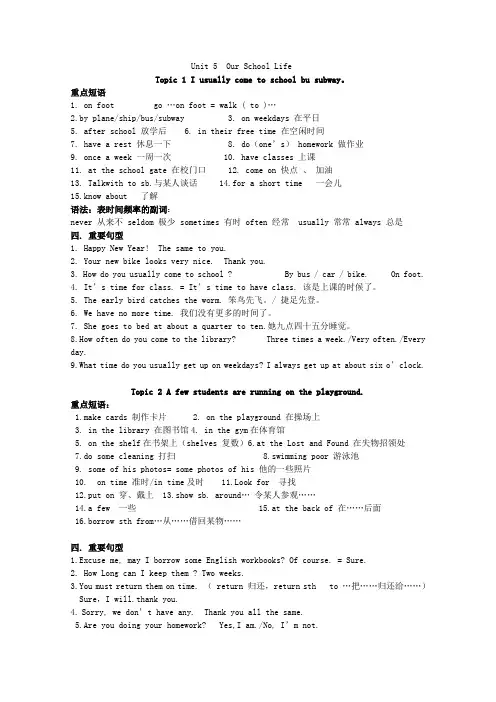
Unit 5 Our School LifeTopic 1 I usually come to school bu subway。
重点短语1. on foot go …on foot = walk ( to )…2.by plane/ship/bus/subway3. on weekdays 在平日5. after school 放学后6. in their free time 在空闲时间7. have a rest 休息一下 8. do(one’s) homework 做作业9. once a week 一周一次10. have classes 上课11. at the school gate 在校门口 12. come on 快点、加油13. Talkwith to sb.与某人谈话 14.for a short time 一会儿15.know about 了解语法:表时间频率的副词:never 从来不 seldom 极少 sometimes 有时 often 经常usually 常常 always 总是四. 重要句型1. Happy New Year! The same to you.2. Your new bike looks very nice. Thank you.3. How do you usually come to school ? By bus / car / bike. On foot.4. It’s time for class. = It’s time to have class. 该是上课的时候了。
5. The early bird catches the worm. 笨鸟先飞。
/ 捷足先登。
6. We have no more time. 我们没有更多的时间了。
7. She goes to bed at about a quarter to ten.她九点四十五分睡觉。
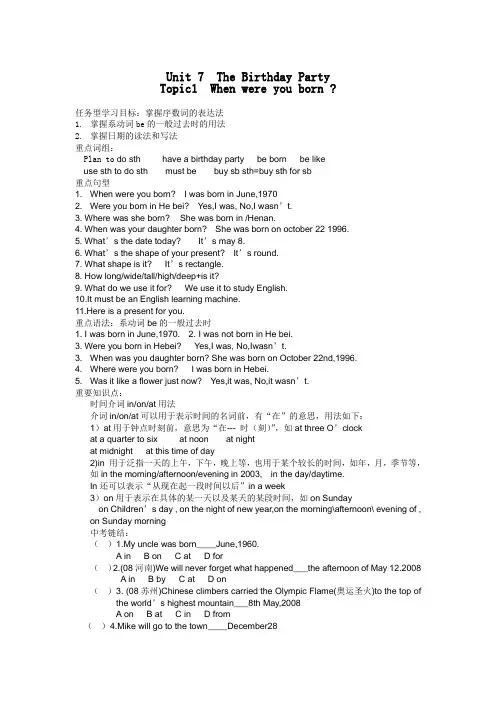
Unit 7 The Birthday PartyTopic1 When were you born ?任务型学习目标:掌握序数词的表达法1.掌握系动词be的一般过去时的用法2.掌握日期的读法和写法重点词组:Plan to do sth have a birthday party be born be likeuse sth to do sth must be buy sb sth=buy sth for sb重点句型1. When were you born? I was born in June,19702. Were you born in He bei? Yes,I was, No,I wasn’t.3. Where was she born? She was born in /Henan.4. When was your daughter born? She was born on october 22 1996.5. What’s the date today? It’s may 8.6. What’s the shape of your present? It’s round.7. What shape is it? It’s rectangle.8. How long/wide/tall/high/deep+is it?9. What do we use it for? We use it to study English.10.It must be an English learning machine.11.Here is a present for you.重点语法:系动词be的一般过去时1. I was born in June,1970.2. I was not born in He bei.3. Were you born in Hebei? Yes,I was, No,Iwasn’t.3. When was you daughter born? She was born on October 22nd,1996.4. Where were you born? I was born in Hebei.5. Was it like a flower just now? Yes,it was, No,it wasn’t.重要知识点:时间介词in/on/at用法介词in/on/at可以用于表示时间的名词前,有“在”的意思,用法如下:1)at用于钟点时刻前,意思为“在--- 时(刻)”,如at three O’clockat a quarter to six at noon at nightat midnight at this time of day2)in 用于泛指一天的上午,下午,晚上等,也用于某个较长的时间,如年,月,季节等,如in the morning/afternoon/evening in 2003, in the day/daytime.In还可以表示“从现在起一段时间以后”in a week3)on用于表示在具体的某一天以及某天的某段时间,如on Sundayon Children’s day , on the night of new year,on the morning\afternoon\ evening of , on Sunday morning中考链结:()1.My uncle was born____June,1960.A inB onC atD for()2.(08河南)We will never forget what happened___the afternoon of May 12.2008A inB byC atD on()3. (08苏州)Chinese climbers carried the Olympic Flame(奥运圣火)to the top of the world’s highest mountain___8th May,2008A onB atC inD from()4.Mike will go to the town____December28Unit7 Top2复习教案一.知识网络梳理1.重点词组:at the birthday party在生日聚会上perform ballet跳芭蕾舞dance to disco 跳迪斯科take these flowers to 把这些花带去。
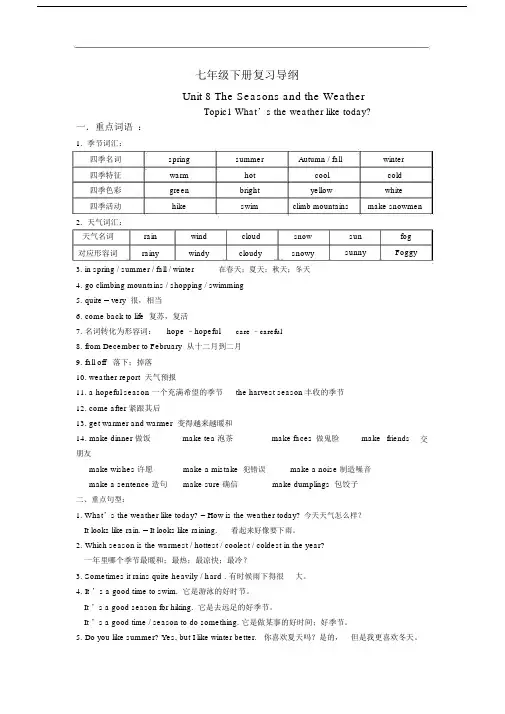
七年级下册复习导纲Unit 8 The Seasons and the WeatherTopic1 What’s the weather like today?一.重点词语:1.季节词汇:四季名词spring summer Autumn / fall winter 四季特征warm hot cool cold 四季色彩green bright yellow white 四季活动hike swim climb mountains make snowmen 2.天气词汇:天气名词rain wind cloud snow 对应形容词rainy windy cloudy snowy 3. in spring / summer / fall / winter在春天;夏天;秋天;冬天sun fog sunny Foggy4.go climbing mountains / shopping / swimming5.quite = very 很,相当e back to life 复苏,复活7. 名词转化为形容词:hope –hopeful care –careful8.from December to February 从十二月到二月9.fall off 落下;掉落10.weather report 天气预报11. a hopeful season 一个充满希望的季节the harvest season丰收的季节e after 紧跟其后13.get warmer and warmer 变得越来越暖和14. make dinner 做饭make tea 泡茶make faces 做鬼脸make friends 交朋友make wishes 许愿make a sentence 造句make a mistakemake sure 确信犯错误make a noise 制造噪音make dumplings 包饺子二、重点句型:1. What’s the weather like today? = How is the weather today?今天天气怎么样?It looks like rain. = It looks like raining.看起来好像要下雨。
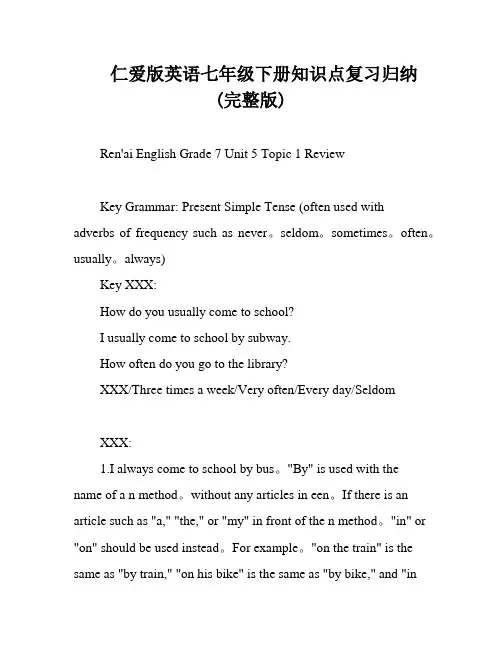
仁爱版英语七年级下册知识点复习归纳(完整版)Ren'ai English Grade 7 Unit 5 Topic 1 ReviewKey Grammar: Present Simple Tense (often used with adverbs of frequency such as never。
seldom。
sometimes。
often。
usually。
always)Key XXX:How do you usually come to school?I usually come to school by subway.How often do you go to the library?XXX/Three times a week/Very often/Every day/SeldomXXX:1.I always come to school by bus。
"By" is used with the name of a n method。
without any articles in een。
If there is an article such as "a," "the," or "my" in front of the n method。
"in" or "on" should be used instead。
For example。
"on the train" is the same as "by train," "on his bike" is the same as "by bike," and "inmy car" is the same as "by car." To distinguish een "on foot" and "walk," "on foot" means "walking" XXX but only as an adverb of manner at the end of a sentence。
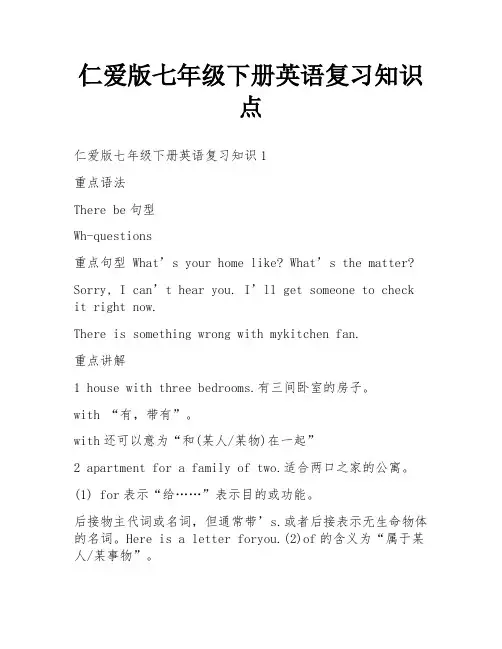
仁爱版七年级下册英语复习知识点仁爱版七年级下册英语复习知识1重点语法There be句型Wh-questions重点句型What’s your home like? What’s the matter?Sorry, I can’t hear you. I’ll get someone to check it right now.There is something wrong with mykitchen fan.重点讲解1 house with three bedrooms.有三间卧室的房子。
with “有,带有”。
with还可以意为“和(某人/某物)在一起”2 apartment for a family of two.适合两口之家的公寓。
(1) for表示“给……”表示目的或功能。
后接物主代词或名词,但通常带’s.或者后接表示无生命物体的名词。
Here is a letter foryou.(2)of的含义为“属于某人/某事物”。
She is a friend of Lily’s. = She is Lily’s friend.3 What’s the matter?怎么了?该句常用来询问某或某物出了什么什么问题或毛病;询问具体某人或某物出了什么问题时,还可以表达为:What’s the matter with sb./sth.某人或某物出了什么毛病。
What’s the matter? = What’swrong?4 Ihear you playing the piano.我听见你在弹钢琴。
hear…doing sth.“听见……在做某事”,强调正在进行的动作。
hear…dosth.“听见……做了某事”,强调全过程。
hearabout sth.听到关于某事物的消息 hear from sb.接到某人的来信、电话等hear of sb./sth.听到或知道某人或某事物的情况5 a lot of = lots of许多后接可数名词,相当于many;后接不可数名词,相当于much,用于肯定句中;但是注意:如果是否定句,则常用many或much.6 be far from… 离……远(抽象距离)be…away from…离……远(具体距离)My school is not far from thebookstore. The sea is 2 miles away fromthe hotel.7 There is something wrong with sb./sth.某人或某物出问题/有毛病了。
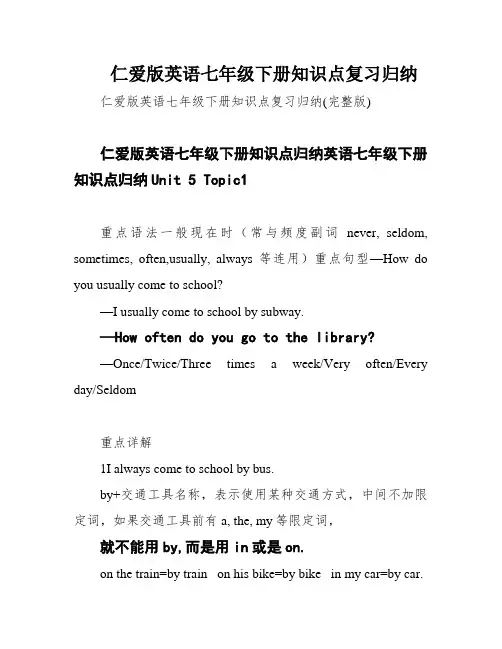
仁爱版英语七年级下册知识点复习归纳仁爱版英语七年级下册知识点复习归纳(完整版)仁爱版英语七年级下册知识点归纳英语七年级下册知识点归纳Unit 5 Topic1重点语法一般现在时(常与频度副词never, seldom, sometimes, often,usually, always等连用)重点句型—How do you usually come to school?—I usually come to school by subway.—How often do you go to the library?—Once/Twice/Three times a week/Very often/Every day/Seldom重点详解1I always come to school by bus.by+交通工具名称,表示使用某种交通方式,中间不加限定词,如果交通工具前有a, the, my等限定词,就不能用by,而是用in或是on.on the train=by train on his bike=by bike in my car=by car.巧辩异同on foot与w alk on foot“走路”,是介词短语,不能作谓语,只作方式状语,位于句末。
walk“走路”,是动词,可以作谓语。
goto…onfoot= walk toI often go to school on foot. =I often walk to school.仁爱版英语七年级下册知识点复习归纳(完整版)同样,go to….bybike = ride a bike togoto….by car = drive a car togo to…by plane = fly togoto…b y bus = take a bus to2 Come on!It’stime for class. come on“快点,加油,来吧”。
It’stime for sth.“该做某事了”,与It’stime to do sth.意思一样。
仁爱英语初一下册复习资料仁爱英语初一下册复习资料七年级下册复习导纲Unit 8 The Seasns and the eatherTpi1 hat’s the eather lie tda?一.重点词语:1 季节词汇:四季名词springsuerAutun / fallinter四季特征arhtlld四季色彩greenbrightellhite四季活动hiesilib untainsae snen2 天气词汇:天气名词rainindludsnsunfg对应形容词rainindludsnsunnFgg3 in spring / suer / fall / inter在春天;夏天;秋天;冬天4 g libing untains / shpping / siingquite = ver 很,相当6 e ba t life 复苏,复活7 名词转化为形容词:hpe – hpeful are – areful8 fr Deeber t Februar 从十二月到二月9 fall ff 落下;掉落10 eather reprt 天气预报11 a hpeful seasn 一个充满希望的季节the harvest seasn丰收的季节12 e after 紧跟其后13 get arer and arer 变得越越暖和14 ae dinner 做饭ae tea 泡茶ae faes 做鬼脸ae friends 交朋友ae ishes 许愿ae a istae 犯错误ae a nise 制造噪音ae a sentene 造句ae sure 确信ae duplings 包饺子二、重点句型:1 hat’s the eather lie tda? = H is the eather tda? 今天天气怎么样?It ls lie rain = It ls lie raining 看起好像要下雨。
2 hih seasn is the arest / httest / lest / ldest in the ear?一年里哪个季节最暖和;最热;最凉快;最冷?3 Seties it rains quite heavil / hard 有时候雨下得很大。
七年级英语(仁爱版)下册复习教案Unit 5 OurSchool Life任务形学习目标:1.掌握并能熟练运用表达交通方式的句型。
2.掌握频度副词的表达方式。
3.掌握一般现在是的用法。
Topic 1How doyouusually cometo school ?二.重点短语:1. on foot go…on foot =walk ( to)…2. by+交通工具“乘坐…”by bus /bike/ plane /train / subway / ship / b oat/car3.takethe bus= go …bybusride abike =go …by biketakethe subway =go…by subway4. onweekdays 在平日5.after school放学后 after class下课后afterbreakfast/ lunch/supper早餐/ 午餐/晚餐后6. in their free time 在空闲时间7. have a rest休息一下 8.readbooks 读书 11. goswimming 去游泳12.listen to music听音乐12. watch TV 看电视13.do(one’s)homework 做作业14. goto the zoo / park 去动物园/公园15.once aweek 一周一次 16. every day 每天 17.have classes上课 18.for alittle while一会儿19. go tobed上床睡觉 20.have breakfast/lunch /supper(dinner)吃早餐/ 午餐/ 晚餐 22.at the sc hoolgate 在校门口23. come on 快点、加油24. getup起床25. talk with /to sb.与某人谈话26. at school 在学校、在上课 27. gotosch ool 去上学28. and soon ……等等三.语法:表时间频率的副词:never 从来不seldom 极少sometimes有时often经常usually 常常always总是1.I never go to school by subway.2. I seldomwalk to school. 3. Maria sometimes takesthe subway home. 4. Li Xiangoftenridesa biketoschool.5. We usuallygoto theparkonfoot.6. Theyalways go to the zoo bybus.7. How oftendoyou come tothe library? Veryoften /Twice a week / Once a week /Every day.四. 重要句型1.HappyNew Year! The sameto you.2. Yournew bike looksverynice. Thankyou.3.How do you usually cometo school? By bus/ car/ bik e.On foot.4.It’stimefor class. =It’stime tohave class.该是上课的时候了。
仁爱版英语七年级下册知识点归纳英语七年级下册知识点归纳Unit 5 Topic1重点语法一般现在时(常与频度副词never, seldom, sometimes, often ,usually, always等连用)重点句型—How do you usually come to school?—I usually come to school by subway.—How often do you go to the library?—Once/Twice/Three times a week/Very often/Every day/Seldom重点详解1I always come to school by bus.by+交通工具名称,表示使用某种交通方式,中间不加限定词,如果交通工具前有a, the, my 等限定词,就不能用by,而是用in或是on.on the train=by train on his bike=by bike in my car=by car.巧辩异同on foot 与walk on foot “走路”,是介词短语,不能作谓语,只作方式状语,位于句末。
walk “走路”,是动词,可以作谓语。
go to…on foot= walk toI often go to school on foot. =I often walk to school.同样,go to….by bike = ride a bike togo to…. by car = drive a car togo to … by plane = fly togo to… by bus = take a bus to2 Come on! It’s time for class. come on “快点,加油,来吧”。
It’s time for sth. “该做某事了”,与 It’s time to do sth.意思一样。
仁爱版七年级下英语总复习材料Unit 5 Our School LifeTopic 1 how do you usually go to school ?1.at the school gate 在学校大门口2.Happy New Year! 新年快乐3.The same to you! 也同样祝你--- ---4.looks very nice! 看起来漂亮e to school 来上学e by bike= ride(s) a bike 骑自行车7.go by subway=take(s) the subway= in asubway乘地铁8.go by bus=take (s) a bus / in a bus / on abus 乘公共汽车9.by plane / by air /in a plane / on a plane乘飞机10.by car /in a car / take a car 坐小汽车11.by train / in a train / on a train / take atrain乘火车12.by ship/by boat / on a ship/boat / take theship 坐船13.go on foot=walk to 步行14.walk to school 走路上学15.watch TV 看电视16.do one`s homework 做家庭作业17.see a movie 看电影18.Good evening 晚上好19.want to do sth 想要做某事20.what time 什么时间21.get up起床22.on weekdays 周末23.at about six o’clock 在大约六点钟e on 快点25.It`s time for class 该上课了26.It`s time to have class 该上课了27.know about 了解--- --- 的情况28.school life 学校生活29.American students 美国学生30.take a yellow school bus 乘一辆黄色的校车31.have/has lunch 吃午餐32.at school 在学校,在上学33.eat out外出吃饭,上馆子34.on school days 在校期间35.have a short rest休息一会儿36.after lunch午餐后37.after supper/after dinner 晚饭后38.after class下课后39.after school放学后40.listen to music 听音乐41.read books看书42.go to the park 去公园43.go to the zoo去动物园44.go to the library去图书馆45.go to school去上学46.go to work去上班47.school is over 放学了48.class is over 下课了49.in one`s free/spare time50.在某人的业余时间里51.play basketball 打篮球52.play soccer 踢足球53.go swimming 去游泳54.go shopping 去买东西55.go fishing 去钓鱼56.go skating 去滑旱冰57.go skiing 去滑冰58.go climbing mountains 去爬山59.go hiking 去远足60.how often多久一次61.ball games 球赛62.have ball games 举行球赛63.four times a year 每年四次64.meet friends 见朋友65.once a week 每周一次66.twice a week 每周两次67.three times a week 每周三次68.Work must come first! 工作〔学习〕必须放在第一69.twenty past six 六点过二十分70.at twenty past six 在六点二十分71.have / has breakfast 吃早餐72.have / has lunch 吃午餐73.have / has supper 吃晚餐74.have / has dinner 吃晚餐75.half past seven 七点半76. a quarter past five 五点过十五分77.get home 到家78.go / goes to bed 上床睡觉79. a quarter to ten 十点过十五分80.drive a car 开小汽车81.the Great Wall 长城Topic 2 He is playing soccer on theplaygroundputer room 电脑室2.dining hall 食堂3.teachers` office 教师办公室4.classroom building 教学楼5.swimming pool 游泳池6.in the library 在图书馆7.in the dormitory 在宿舍里8.in the dining hall 在食堂里9.on the playground 在操场上10.at the moment = now此刻,现在11.clean the dormitory打扫宿舍12.clean the bedroom 打扫卧室13.clean the classroom 打扫教室14.clean the blackboard擦黑板15.make cards 制作卡片16.Would you like to --- --- ?17.你想做--- --- 吗?18.Good idea!好主意19.See you soon 一会儿见20.play computer games 玩电脑游戏21.May I borrow --- --- 我可以借--- ---吗?22. a few几个,一些23.Ren’ai Project English workbooks 仁爱英语练习册24.of course = sure = certainly 当然25.on time 准时26.in time 及时27.many students 许多学生28.do well in= be good at sth / doing sth在--- ---做得好29.do better in 在--- --- 做得更好30.31.on the shelf 在书架上32.return = give back 归还33.It’s a pleasure 不用谢34.Thank you all the same 还是要谢谢你35.lost and found 失物招领处36.looking for 寻找37.some money 一些钱38. a picture of my family 一张全家福照片39.thank you all the same 还是要谢谢你40.school student card 学生卡41. a pair of pants 一条裤子42. a pair of shoes 一双鞋43.two pairs of shoes 两双鞋44.singing in the room 在房间里唱歌45.dancing in the gym 在体育馆跳舞46.swimming in the gym 在体育馆游泳47.show sb around 带领某人参观48.in the center of= in the middle of 在------ 的中间,在--- --- 的中央49.on the left 在左边50.on the right 在右边51.next to 在--- --- 隔壁,在--- ---旁边,紧挨看,靠近52.at the back of 在--- ---后部,在--- --- 后53.near the playground 在操场的附近54.in the gym 在体育馆里,在健身房里55.in the swimming pool在游泳池里56.talk about their families 谈论他们家庭57.Attention, please ! 请注意!58.between --- and --在--- --- 和--- --- 之间59.stamp collection show 集邮展60.school hall 学校大厅61.every Saturday 每个星期六62.he is running 他在跑步63.in picture 1 在第一张照片里64.in picture 2 在第二张照片里65.look(looks) happy 看起来高兴66.love swimming 喜欢游泳67.talk to a Japanese girl和一个日本女孩交谈68.play the guitar 弹吉它69.in the classroom 在教室里70.in the office 在办公室里71.in the dormitory 在宿舍里72.on the playground 在操场上Topic 3 our school is very interesting1.What day 用来提问“星期几”2.have a music class 上一节音乐课3.at ten o`clock 十点钟4. a quarter to eleven 十点四十五分5.have a biology lesson上一节生物课6.have a geography 上一节地理课7.have a P.E. lesson 上一节体育课8.have an art lesson 上一节美术课9.outdoor activities 户外活动10.how many lessons 多少节课11.every week 每周12.singing and dancing唱歌跳舞13.drawing pictures 画画14.Working on math problems 做数学题15.speaking English 说英语16.learning about the past 了解过去17.an English book 一本英语书18.What do you think of it = How do youlike it ? 你觉得它怎么样?19.Difficult and boring 难学而且乏味20.Which subject 哪一门课21.Easy and interesting 容易又有趣22.Favorite subject 最喜欢的科目23.My school life 我的学校生活24.At school 在学校里,在上学25.Be friendly to sb = be kind to sb 对某人友好26.In the morning 在上午,在早晨27.In the afternoon 在下午28.I aften speak English with my classmates我经常和我的同学说英语29.After school 放学后30.Play basketball with my classmates和同学们打篮球31.On the playground 在操场上32.Every Tuesday 每周二33.Every Thursday 每周四34.school newpaper 校报35.School Time 校园时代36.And so on 等等37.Science Today 当代科学38.Thank sb for doing sth 感谢某人做了某事39.best wishes 致以美好的祝愿40.read stories 看故事书41.have a biology class 上生物课42.have breakfast 吃早饭43.run on the playground 在操场上跑步44.have a physics class上物理课45.watch animals 欣赏动物46.play soccer at school 在学校踢足球47.read a book at home 在家看书48.have dinner in the school dinning hall在学校食堂吃晚饭49.have dinner at home 在家吃晚饭Unit 6 Our Local AreaTopic 1 Is there a sofa in your study?1.On the second floor 在二楼2.Why not =Why don`t you为什么不--- --- ?3.Go upstairs 上楼4.Go downstairs 下楼5.Have a look 看一看6. A moment later 过了一会儿e in ,please 请进8.So many books 这么多的书9.On the shelf 在书架上10.You have a nice study你的书真漂亮!11.Dining room 餐厅12.Living room 客厅13.On the first floor 在一楼14.Cousins 表姐妹,表兄弟15.In the front of the house 在房子前面16.In the kitchen 在厨房17.In the study 在书房18.In the dinning room 在餐厅19.In the bedroom 在卧室20.In the garden 在花园21.Behind the door 在门后面22.Play with his pet dog和他的宠物狗玩耍23.Play games 玩游戏24.Clean the car 清洗小汽车25.Read books 看书26.Have dinner 吃饭27.Talk about 谈论28.Near my desk 在我桌子旁29.On your desk 在你桌子上30.So on 等等31.My family photo 我的全家福照片32.On the wall 在墙上33.Put them away 请把它们收起来放好34.Put it away,please把它/它们收起来放好35.Look after = take care of 照看,照顾36.In front the house 房子前面37.In the bottle 瓶子里38.Near the window 窗户边39.In the glass 杯子里40.Model planes 飞机模型41.Under the bed 床下42.How many pairs 多少双43.In the tree 树上44.On the tree 树上45.On the shelf 书架上46.On the river 河里47. A small garden 一个小花园48.Many beautiful flowers 许多美丽的花49.In the garden 花园里50. A big tree 一棵大树51.Under the tree 在树下52.Very beautiful 非常漂亮53. A large living room 一个在客厅54. A dining room 一个餐厅55. A kitchen 一个厨房56. A bathroom 一个卫生间57.I like watching TV in the living room我喜欢在客厅里看电视58.I love playing on the computer in thestudy我喜欢在书房里玩电脑59.In the drawer 在抽屉里60.On the chair 在椅子上61.Under the chair 在椅子下62.In picture A 图A里63.In picture B 图B里64.On the walls 在墙上65.In 在--- --- 里面66.On 在--- --- 上面67.Behind 在--- --- 下面68.Near 在--- --- 附近69.Next to 在--- --- 旁边70.In the front of 在--- --- 前面71.Don`t put it / them here 别把它/它们放在这儿72.Write a letter 写一封信73.Describe different rooms in your home描述你家不同的房间74.The things around your home 房子周围的事物75.I`m very glad to 我很高兴76.Get a letter from sb= hear from sb 收到某人的来信77.Tell sb about sth 告诉某人关于某事78.Tell sb to do sth 告诉某人做某事79.Tell sb sth 告诉某人某事Topic 2 What`s your home like?1.What`s your home like? 你家是什么样的?2.An apartment building 一座公寓3. A town house 城镇住宅4.Live with sb 和某从居住在一起5.Your grandparents 你的爷爷和奶奶6. A big farmhouse 农舍7.In the country 在农村8.Look for 寻找9.Let`s help him 我们去帮助他吧10.In our group 在我们小组11.For rent 出租12.Wanted 求租13.Small apartment for students小型学生公寓14.¥850 a month 每月850元15.Call Ms. Zhang 联系张女士16.House with three bedrooms 一套三居室的房子17.House with furniture for a family of three适合三口之家,家具齐全的房子18.Looking for a quiet double room 求租一间安静的双人间under ¥300 per month 月租低于300元19.Apartment for a family of two 适合两口之家的公寓20.House with four bedrooms 四居室21.Quiet double room 安静的双人间22.Excuse me 打搅了,打搅一下,劳驾,23.Your new neighbor 你的新邻居24.I`m looking for a store我在找一家商店25.On the street corner 在街道拐角处26.Post office 邮局27.Bookstore 书店28.Museum 博物馆29.Parking lot 停车场30.Supermarket 超市31.Hospital 医院32.Bank 银行33.Train station 火车站34.Park cars 停车35.Keep money 存钱36.Take trains 乘火车37.See a doctor 看医生38.Buy food 买食物39.Mail letters 邮寄信40.Buy books 买书41.Keep and show things保存和陈列物品42.Bookstored 书店43.Restaurant ['restərənt] 饭店44.I`m afaid it`s too loud 恐怕声音有点儿大45.I`m really sorry about that 十分抱歉46.At the end of 、Road 在、、、路的尽头47.On the right 在右边48. A tall tree 一棵大树49.Lot of = lots of 许多50.Tall buildings 高楼51.Small gardens 小花园52.Close to 离--- --- 近,紧挨着的53.Far from 离--- --- 远54.Not far from 离--- --- 不远55.Call it for help 打向它求助56.How is the community? 社区是什么样的?57.Living near your home 住在你家附近58.Do you like living there?59.This is linda speaking. 我是琳达60.61.What`s the matter? 有什么事吗?62.There is something wrong with =Something is wrong with某人/某物出问题,有毛病了63.Right now 立刻,马上64.From--- to--- 从--- --- 到--- ---65.The traffic is heavy 交通拥挤66.The cost of living is high生活费用高67.Houses with big yards带大院子的房子68. A house with a garden 有花园的房子Topic 3 How can I get to the bookstore?1.Go up this street to the end 沿着这条街一直走到尽头2.On your left 在你左边3.How can I get to--?我怎样才能去--- --- ?4.Go along Xinhuan Street 沿着新华路走5.Turn left at the first street 在第一条街口向左转6.Go across the bridge 穿过桥7.It`s about one hundre meters along on theright 顺着右边走大约100米〔就到〕8.Which is the way to--- ? 哪一条是到--- --- 路?9.The post office 邮局10.I`m new here 我对这儿不熟11.On 在--- --- 上面12.On the corner of 在--- --- 拐角处13.Across from 在--- --- 正对面14.Between --- and --在--- --- 和--- ---之间15.Near the bridge 在桥的附近16.Turn left and walk on 向左拐并一直往前走17.You can`t miss it 你不会错过的18.Beitai Road 北台路19.Be --- away from 离--- --- 远20.Need to do sth 需要做某事21.Take bus No.718 乘坐718路车22.Change to the No.108 bus at AnzhenBridge 在安贞桥换乘108路车23.The way to Shuanxiu Garden 去双秀花园的路24.At Liuli Bridge 六里桥25.How far “多远”,问距离。
七年级英语(仁爱版)下册复习教案Unit 5 Our School Life任务形学习目标:1.掌握并能熟练运用表达交通方式的句型。
2.掌握频度副词的表达方式。
3.掌握一般现在是的用法。
Topic 1 How do you usually come to school ?二.重点短语:1. on foot go …on foot = walk ( to )…2. by + 交通工具“乘坐…” by bus / bike / plane / train / subway / ship / boat / car3.take the bus = go …by bus ride a bike = go …by bike take the subway = go …by subway4. on weekdays 在平日5. after school 放学后 after class 下课后after breakfast / lunch / supper早餐/ 午餐/ 晚餐后6. in their free time 在空闲时间7. have a rest 休息一下8. read books 读书 11. go swimming 去游泳 12. listen to music 听音乐 12. watch TV 看电视 13. do(one’s)homework 做作业 14. go to the zoo / park 去动物园/ 公园15. once a week 一周一次 16. every day 每天 17. have classes 上课 18. for a little while 一会儿 19. go to bed 上床睡觉 20. have breakfast / lunch / supper(dinner)吃早餐/ 午餐/ 晚餐 22. at the school gate 在校门口23. come on 快点、加油24. get up 起床 25. talk with / to sb.与某人谈话26. at school 在学校、在上课 27. go to school 去上学28. and so on ……等等三.语法:表时间频率的副词:never 从来不seldom 极少sometimes 有时often 经常usually 常常always 总是1. I never go to school by subway.2. I seldom walk to school.3. Maria sometimes takes the subway home.4. Li Xiang often rides a bike to school.5. We usually go to the park on foot.6. They always go to the zoo by bus.7. How often do you come to the library ? Very often / Twice a week / Once a week / Every day.四. 重要句型1. Happy New Year! The same to you.2. Your new bike looks very nice. Thank you.3. How do you usually come to school ? By bus / car / bike. On foot.4.It’s time for class. = It’s time to have class. 该是上课的时候了。
5. The early bird catches the worm. 笨鸟先飞。
/ 捷足先登。
6. We have no more time. 我们没有更多的时间了。
7. I have four classes in the morning and two in the afternoon.我早上上四节课,下午上两节。
8. She goes to bed at about a quarter to ten. 她九点四十五分睡觉。
Topic 2 He is running on the playground.二.重点短语:1. make cards 制作卡片 2. on the playground 在操场上 3. in the library 在图书馆4. in the gym在体育馆5. on the shelf在书架上(shelves 复数)6. at the Lost and Found 在失物招领处7.clean the room打扫房间8.have a soccer game 举行足球比赛9. have an English class 上英语课10. write a letter 写信11. some of his photos= some photos of his 他的一些照片12. on time 准时/in time及时14. do better in sth 在某方面做得较好15.put on 穿、戴上、上演(代词it / them放在中间,名词中间或后面,put it / them on )16. show sb. around… 令某人参观……三.语法:现在进行时态主语+ be(is / am / are )+ 动词ing + 其他。
表示正在进行或发生的动作。
常与now = at the moment 现在、look看、listen听等连用。
1. I’m looking for my purse.2. They aren’t sleeping at the moment.3. Are you doing your homework ? Yes, I am. No, I’m not.4. Is he / she singing now ? Yes, he / she is. No, he / she isn’t.5. What is your brother doing ? He is running in the gym.四. 重要句型1.Excuse me, may I borrow your story book ? Of course. = Sure. (borrow sth from…从……借回某物……)2. How Long may I keep the book ? Two weeks. ( keep 借用,后面常跟一段时间连用)3.You must return them on time. (return 归还,return sth to …把……归还给……)4. Thank you. It’s a pleasure. = A pleasure = My pleasure. 别客气。
5. Sorry, I don’t have any.Thank you all the same. 仍然感谢你。
6. See you soon. 回头见.7. What else ? 还有别的什么?(else 其他的、别的,常放在疑问词what/ where / who…和不定代词something/ somebody等的后面)Topic 3 My school life is very interesting.二.重点短语:1. outdoor activity 课外活动 2. easy and interesting 容易又有趣 3.difficult and boring 又难又乏味 4. be friendly to sb. =be kind to sb. 对某人友好5.between…and… 在……之间…6. learn…from… 向……学习……/ 从…中学……7. from…to… 从……到…… 8. in the morning / afternoon / evening 在早上/ 下午/ 晚上9.on Monday 在星期一on Monday morning在星期一的早上11. tell sb. about sth告诉某人关于某事三.语法:一般现在时主语+ 动词原形/ 动词第三人称单数s/es + 其他。
表示经常或习惯性的动作。
常与频率副词:never 从来不seldom 极少sometimes 有时often 经常usually 常常always 总是或every day 每天、in the morning / afternoon / evening 在早上/ 下午/ 晚上等连用。
例如:I often do my homework in the evening. I don’t often go shopping on Sunday.Do you usually come to school by car? Yes, I do. No, I don’t.Sometimes she watches TV in the evening. She doesn’t like Chinese.Does she often take a bus to school ? Yes, she does. No, she doesn’t.四. 重要句型1.What day is it today?It’s Sunday / Monday / Tuesday / Wednesday / Thursday / Friday / Saturday.(在英语国家每周的第一天是星期天而不是星期一)2. What class are they having ? They are having a music class.3. What time does the class begin ? At ten o’clock.4. What do you think of math? = How do you like math ? 你认为数学怎么样?It’s difficult and boring.5. Why (为什么)do you like English ? Because(因为)it’s easy and interesting.7.What subject (学科)do you like best ? I like history best.8. At school, my teachers and classmates are very friendly to me.9. I study Chinese, English, politics, geography and some other subjects.(other泛指其他的,别的+ 名词复数)10.English is my favorite (最喜欢的)subject. I also like P.E and music.= I like P.E and music , too. (也)11.Can you tell me something about it ?五.词语辨析a few 几个,一些 + 名词复数 a little 一点儿 +不可数名词many 许多+名词复数few几乎没有 little 几乎没有 much许多、大量的+不可数名词other泛指其他的,别的+ 名词复数another 泛指又一个、再一个、另一个+ 名词单数the other 两者中的另一个Unit 6 Our Local AreaTopic1 Is there a sofa in your study?一、学习目标1、掌握单词和重点词组2、掌握there be的各种形式及用法3、能熟练用英语描写房间、家庭、学校等建筑4、熟练掌握方位介词in, on, behind, under, near, next to, in front of二、重点词组On the first floor 美式英语一楼floor地板,此处指“楼房的层”。